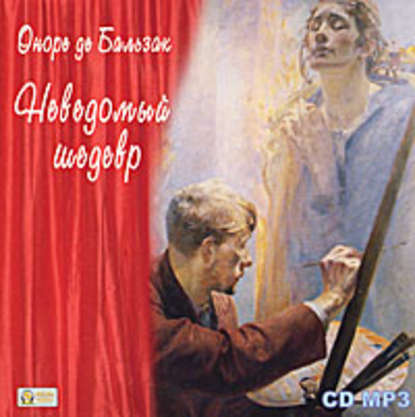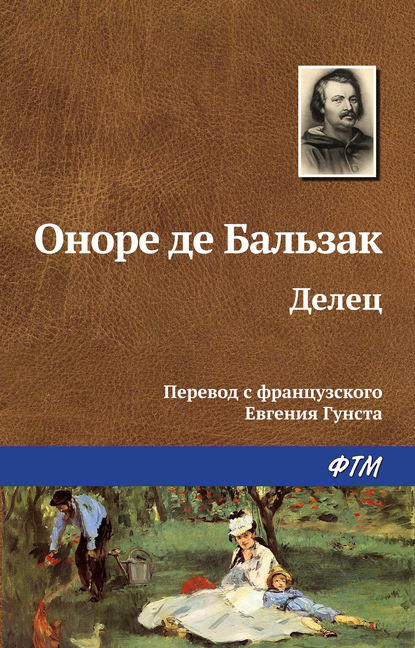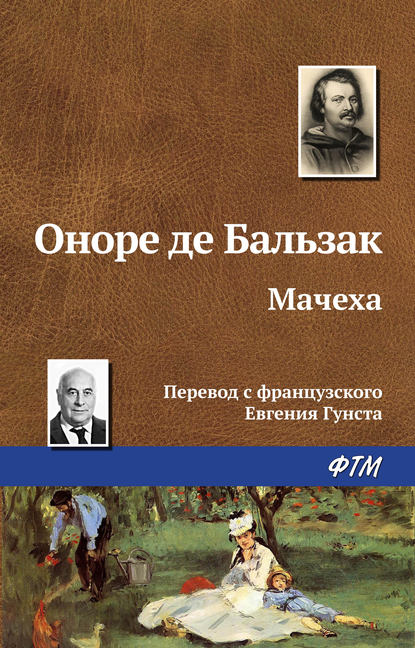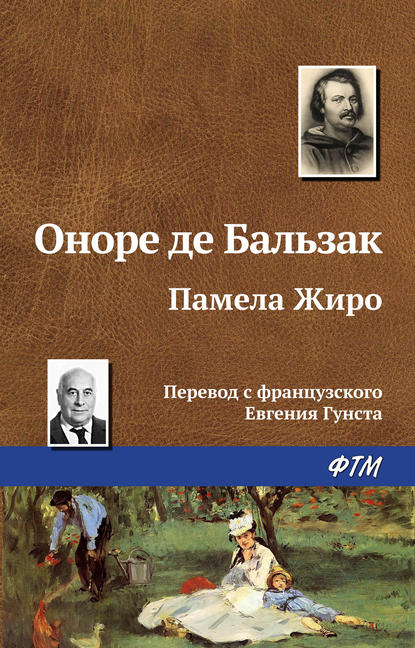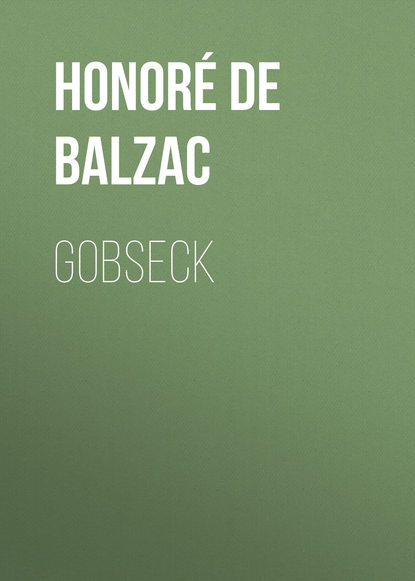
Полная версия
Gobseck

Honoré de Balzac
Gobseck
Among all the pupils of the Oratorian school at Vendome, we are, I think, the only two who have afterwards met in mid-career of a life of letters – we who once were cultivating Philosophy when by rights we should have been minding our De viris. When we met, you were engaged upon your noble works on German philosophy, and I upon this study. So neither of us has missed his vocation; and you, when you see your name here, will feel, no doubt, as much pleasure as he who inscribes his work to you. – Your old schoolfellow,
1840De Balzac.
GOBSECK
It was one o’clock in the morning, during the winter of 1829-30, but in the Vicomtesse de Grandlieu’s salon two persons stayed on who did not belong to her family circle. A young and good-looking man heard the clock strike, and took his leave. When the courtyard echoed with the sound of a departing carriage, the Vicomtesse looked up, saw that no one was present save her brother and a friend of the family finishing their game of piquet, and went across to her daughter. The girl, standing by the chimney-piece, apparently examining a transparent fire-screen, was listening to the sounds from the courtyard in a way that justified certain maternal fears.
“Camille,” said the Vicomtesse, “if you continue to behave to young Comte de Restaud as you have done this evening, you will oblige me to see no more of him here. Listen, child, and if you have any confidence in my love, let me guide you in life. At seventeen one cannot judge of past or future, nor of certain social considerations. I have only one thing to say to you. M. de Restaud has a mother, a mother who would waste millions of francs; a woman of no birth, a Mlle. Goriot; people talked a good deal about her at one time. She behaved so badly to her own father, that she certainly does not deserve to have so good a son. The young Count adores her, and maintains her in her position with dutifulness worthy of all praise, and he is extremely good to his brother and sister. – But however admirable his behavior may be,” the Vicomtesse added with a shrewd expression, “so long as his mother lives, any family would take alarm at the idea of intrusting a daughter’s fortune and future to young Restaud.”
“I overheard a word now and again in your talk with Mlle. de Grandlieu,” cried the friend of the family, “and it made me anxious to put in a word of my own. – I have won, M. le Comte,” he added, turning to his opponent. “I shall throw you over and go to your niece’s assistance.”
“See what it is to have an attorney’s ears!” exclaimed the Vicomtesse. “My dear Derville, how could you know what I was saying to Camille in a whisper?”
“I knew it from your looks,” answered Derville, seating himself in a low chair by the fire.
Camille’s uncle went to her side, and Mme. de Grandlieu took up her position on a hearth stool between her daughter and Derville.
“The time has come for telling a story, which should modify your judgment as to Ernest de Restaud’s prospects.”
“A story?” cried Camille. “Do begin at once, monsieur.”
The glance that Derville gave the Vicomtesse told her that this tale was meant for her. The Vicomtesse de Grandlieu, be it said, was one of the greatest ladies in the Faubourg Saint-Germain, by reason of her fortune and her ancient name; and though it may seem improbable that a Paris attorney should speak so familiarly to her, or be so much at home in her house, the fact is nevertheless easily explained.
When Mme. de Grandlieu returned to France with the Royal family, she came to Paris, and at first lived entirely on the pension allowed her out of the Civil List by Louis XVIII. – an intolerable position. The Hotel de Grandlieu had been sold by the Republic. It came to Derville’s knowledge that there were flaws in the title, and he thought that it ought to return to the Vicomtesse. He instituted proceedings for nullity of contract, and gained the day. Encouraged by this success, he used legal quibbles to such purpose that he compelled some institution or other to disgorge the Forest of Liceney. Then he won certain lawsuits against the Canal d’Orleans, and recovered a tolerably large amount of property, with which the Emperor had endowed various public institutions. So it fell out that, thanks to the young attorney’s skilful management, Mme. de Grandlieu’s income reached the sum of some sixty thousand francs, to say nothing of the vast sums returned to her by the law of indemnity. And Derville, a man of high character, well informed, modest, and pleasant in company, became the house-friend of the family.
By his conduct of Mme. de Grandlieu’s affairs he had fairly earned the esteem of the Faubourg Saint-Germain, and numbered the best families among his clients; but he did not take advantage of his popularity, as an ambitious man might have done. The Vicomtesse would have had him sell his practice and enter the magistracy, in which career advancement would have been swift and certain with such influence at his disposal; but he persistently refused all offers. He only went into society to keep up his connections, but he occasionally spent an evening at the Hotel de Grandlieu. It was a very lucky thing for him that his talents had been brought into the light by his devotion to Mme. de Grandlieu, for his practice otherwise might have gone to pieces. Derville had not an attorney’s soul. Since Ernest de Restaud had appeared at the Hotel de Grandlieu, and he had noticed that Camille felt attracted to the young man, Derville had been as assiduous in his visits as any dandy of the Chausee-d’Antin newly admitted to the noble Faubourg. At a ball only a few days before, when he happened to stand near Camille, and said, indicating the Count:
“It is a pity that yonder youngster has not two or three million francs, is it not?”
“Is it a pity? I do not think so,” the girl answered. “M. de Restaud has plenty of ability; he is well educated, and the Minister, his chief, thinks well of him. He will be a remarkable man, I have no doubt. ‘Yonder youngster’ will have as much money as he wishes when he comes into power.”
“Yes, but suppose that he were rich already?”
“Rich already?” repeated Camille, flushing red. “Why all the girls in the room would be quarreling for him,” she said, glancing at the quadrilles.
“And then,” retorted the attorney, “Mlle. de Grandlieu might not be the one towards whom his eyes are always turned? That is what that red color means! You like him, do you not? Come, speak out.”
Camille suddenly rose to go.
“She loves him,” Derville thought.
Since that evening, Camille had been unwontedly attentive to the attorney, who approved of her liking for Ernest de Restaud. Hitherto, although she knew well that her family lay under great obligations to Derville, she had felt respect rather than real friendship for him, their relation was more a matter of politeness than of warmth of feeling; and by her manner, and by the tones of her voice, she had always made him sensible of the distance which socially lay between them. Gratitude is a charge upon the inheritance which the second generation is apt to repudiate.
“This adventure,” Derville began after a pause, “brings the one romantic event in my life to my mind. You are laughing already,” he went on; “it seems so ridiculous, doesn’t it, that an attorney should speak of a romance in his life? But once I was five-and-twenty, like everybody else, and even then I had seen some queer things. I ought to begin at the beginning by telling you about some one whom it is impossible that you should have known. The man in question was a usurer.
“Can you grasp a clear notion of that sallow, wan face of his? I wish the Academie would give me leave to dub such faces the lunar type. It was like silver-gilt, with the gilt rubbed off. His hair was iron-gray, sleek, and carefully combed; his features might have been cast in bronze; Talleyrand himself was not more impassive than this money-lender. A pair of little eyes, yellow as a ferret’s, and with scarce an eyelash to them, peered out from under the sheltering peak of a shabby old cap, as if they feared the light. He had the thin lips that you see in Rembrandt’s or Metsu’s portraits of alchemists and shrunken old men, and a nose so sharp at the tip that it put you in mind of a gimlet. His voice was so low; he always spoke suavely; he never flew into a passion. His age was a problem; it was hard to say whether he had grown old before his time, or whether by economy of youth he had saved enough to last him his life.
“His room, and everything in it, from the green baize of the bureau to the strip of carpet by the bed, was as clean and threadbare as the chilly sanctuary of some elderly spinster who spends her days in rubbing her furniture. In winter time, the live brands of the fire smouldered all day in a bank of ashes; there was never any flame in his grate. He went through his day, from his uprising to his evening coughing-fit, with the regularity of a pendulum, and in some sort was a clockwork man, wound up by a night’s slumber. Touch a wood-louse on an excursion across your sheet of paper, and the creature shams death; and in something the same way my acquaintance would stop short in the middle of a sentence, while a cart went by, to save the strain to his voice. Following the example of Fontenelle, he was thrifty of pulse-strokes, and concentrated all human sensibility in the innermost sanctuary of Self.
“His life flowed soundless as the sands of an hour-glass. His victims sometimes flew into a rage and made a great deal of noise, followed by a great silence; so is it in a kitchen after a fowl’s neck has been wrung.
“Toward evening this bill of exchange incarnate would assume ordinary human shape, and his metals were metamorphosed into a human heart. When he was satisfied with his day’s business, he would rub his hands; his inward glee would escape like smoke through every rift and wrinkle of his face; – in no other way is it possible to give an idea of the mute play of muscle which expressed sensations similar to the soundless laughter of Leather Stocking. Indeed, even in transports of joy, his conversation was confined to monosyllables; he wore the same non-committal countenance.
“This was the neighbor Chance found for me in the house in the Rue de Gres, where I used to live when as yet I was only a second clerk finishing my third year’s studies. The house is damp and dark, and boasts no courtyard. All the windows look on the street; the whole dwelling, in claustral fashion, is divided into rooms or cells of equal size, all opening upon a long corridor dimly lit with borrowed lights. The place must have been part of an old convent once. So gloomy was it, that the gaiety of eldest sons forsook them on the stairs before they reached my neighbor’s door. He and his house were much alike; even so does the oyster resemble his native rock.
“I was the one creature with whom he had any communication, socially speaking; he would come in to ask for a light, to borrow a book or a newspaper, and of an evening he would allow me to go into his cell, and when he was in the humor we would chat together. These marks of confidence were the results of four years of neighborhood and my own sober conduct. From sheer lack of pence, I was bound to live pretty much as he did. Had he any relations or friends? Was he rich or poor? Nobody could give an answer to these questions. I myself never saw money in his room. Doubtless his capital was safely stowed in the strong rooms of the Bank. He used to collect his bills himself as they fell due, running all over Paris on a pair of shanks as skinny as a stag’s. On occasion he would be a martyr to prudence. One day, when he happened to have gold in his pockets, a double napoleon worked its way, somehow or other, out of his fob and fell, and another lodger following him up the stairs picked up the coin and returned it to its owner.
“‘That isn’t mine!’ said he, with a start of surprise. ‘Mine indeed! If I were rich, should I live as I do!’
“He made his cup of coffee himself every morning on the cast-iron chafing dish which stood all day in the black angle of the grate; his dinner came in from a cookshop; and our old porter’s wife went up at the prescribed hour to set his room in order. Finally, a whimsical chance, in which Sterne would have seen predestination, had named the man Gobseck. When I did business for him later, I came to know that he was about seventy-six years old at the time when we became acquainted. He was born about 1740, in some outlying suburb of Antwerp, of a Dutch father and a Jewish mother, and his name was Jean-Esther Van Gobseck. You remember how all Paris took an interest in that murder case, a woman named La belle Hollandaise? I happened to mention it to my old neighbor, and he answered without the slightest symptom of interest or surprise, ‘She is my grandniece.’
“That was the only remark drawn from him by the death of his sole surviving next of kin, his sister’s granddaughter. From reports of the case I found that La belle Hollandaise was in fact named Sara Van Gobseck. When I asked by what curious chance his grandniece came to bear his surname, he smiled:
“‘The women never marry in our family.’
“Singular creature, he had never cared to find out a single relative among four generations counted on the female side. The thought of his heirs was abhorrent to him; and the idea that his wealth could pass into other hands after his death simply inconceivable.
“He was a child, ten years old, when his mother shipped him off as a cabin boy on a voyage to the Dutch Straits Settlements, and there he knocked about for twenty years. The inscrutable lines on that sallow forehead kept the secret of horrible adventures, sudden panic, unhoped-for luck, romantic cross events, joys that knew no limit, hunger endured and love trampled under foot, fortunes risked, lost, and recovered, life endangered time and time again, and saved, it may be, by one of the rapid, ruthless decisions absolved by necessity. He had known Admiral Simeuse, M. de Lally, M. de Kergarouet, M. d’Estaing, le Bailli de Suffren, M. de Portenduere, Lord Cornwallis, Lord Hastings, Tippoo Sahib’s father, Tippoo Sahib himself. The bully who served Mahadaji Sindhia, King of Delhi, and did so much to found the power of the Mahrattas, had had dealings with Gobseck. Long residence at St. Thomas brought him in contact with Victor Hughes and other notorious pirates. In his quest of fortune he had left no stone unturned; witness an attempt to discover the treasure of that tribe of savages so famous in Buenos Ayres and its neighborhood. He had a personal knowledge of the events of the American War of Independence. But if he spoke of the Indies or of America, as he did very rarely with me, and never with anyone else, he seemed to regard it as an indiscretion and to repent of it afterwards. If humanity and sociability are in some sort a religion, Gobseck might be ranked as an infidel; but though I set myself to study him, I must confess, to my shame, that his real nature was impenetrable up to the very last. I even felt doubts at times as to his sex. If all usurers are like this one, I maintain that they belong to the neuter gender.
“Did he adhere to his mother’s religion? Did he look on Gentiles as his legitimate prey? Had he turned Roman Catholic, Lutheran, Mahometan, Brahmin, or what not? I never knew anything whatsoever about his religious opinions, and so far as I could see, he was indifferent rather than incredulous.
“One evening I went in to see this man who had turned himself to gold; the usurer, whom his victims (his clients, as he styled them) were wont to call Daddy Gobseck, perhaps ironically, perhaps by way of antiphrasis. He was sitting in his armchair, motionless as a statue, staring fixedly at the mantel-shelf, where he seemed to read the figures of his statements. A lamp, with a pedestal that had once been green, was burning in the room; but so far from taking color from its smoky light, his face seemed to stand out positively paler against the background. He pointed to a chair set for me, but not a word did he say.
“‘What thoughts can this being have in his mind?’ said I to myself. ‘Does he know that a God exists; does he know there are such things as feeling, woman, happiness?’ I pitied him as I might have pitied a diseased creature. But, at the same time, I knew quite well that while he had millions of francs at his command, he possessed the world no less in idea – that world which he had explored, ransacked, weighed, appraised, and exploited.
“‘Good day, Daddy Gobseck,’ I began.
“He turned his face towards me with a slight contraction of his bushy, black eyebrows; this characteristic shade of expression in him meant as much as the most jubilant smile on a Southern face.
“‘You look just as gloomy as you did that day when the news came of the failure of that bookseller whose sharpness you admired so much, though you were one of his victims.’
“‘One of his victims?’ he repeated, with a look of astonishment.
“‘Yes. Did you not refuse to accept composition at the meeting of creditors until he undertook privately to pay you your debt in full; and did he not give you bills accepted by the insolvent firm; and then, when he set up in business again, did he not pay you the dividend upon those bills of yours, signed as they were by the bankrupt firm?’
“‘He was a sharp one, but I had it out of him.’
“‘Then have you some bills to protest? To-day is the 30th, I believe.’
“It was the first time I had spoken to him of money. He looked ironically up at me; then in those bland accents, not unlike the husky tones which the tyro draws from a flute, he answered, ‘I am amusing myself.’
“‘So you amuse yourself now and again?’
“‘Do you imagine that the only poets in the world are those who print their verses?’ he asked, with a pitying look and shrug of the shoulders.
“‘Poetry in that head!’ thought I, for as yet I knew nothing of his life.
“‘What life could be as glorious as mine?’ he continued, and his eyes lighted up. ‘You are young, your mental visions are colored by youthful blood, you see women’s faces in the fire, while I see nothing but coals in mine. You have all sorts of beliefs, while I have no beliefs at all. Keep your illusions – if you can. Now I will show you life with the discount taken off. Go wherever you like, or stay at home by the fireside with your wife, there always comes a time when you settle down in a certain groove, the groove is your preference; and then happiness consists in the exercise of your faculties by applying them to realities. Anything more in the way of precept is false. My principles have been various, among various men; I had to change them with every change of latitude. Things that we admire in Europe are punishable in Asia, and a vice in Paris becomes a necessity when you have passed the Azores. There are no such things as hard-and-fast rules; there are only conventions adapted to the climate. Fling a man headlong into one social melting pot after another, and convictions and forms and moral systems become so many meaningless words to him. The one thing that always remains, the one sure instinct that nature has implanted in us, is the instinct of self-interest. If you had lived as long as I have, you would know that there is but one concrete reality invariable enough to be worth caring about, and that is – GOLD. Gold represents every form of human power. I have traveled. I found out that there were either hills or plains everywhere: the plains are monotonous, the hills a weariness; consequently, place may be left out of the question. As to manners; man is man all the world over. The same battle between the poor and the rich is going on everywhere; it is inevitable everywhere; consequently, it is better to exploit than to be exploited. Everywhere you find the man of thews and sinews who toils, and the lymphatic man who torments himself; and pleasures are everywhere the same, for when all sensations are exhausted, all that survives is Vanity – Vanity is the abiding substance of us, the I in us. Vanity is only to be satisfied by gold in floods. Our dreams need time and physical means and painstaking thought before they can be realized. Well, gold contains all things in embryo; gold realizes all things for us.
“‘None but fools and invalids can find pleasure in shuffling cards all evening long to find out whether they shall win a few pence at the end. None but driveling idiots could spend time in inquiring into all that is happening around them, whether Madame Such-an-One slept single on her couch or in company, whether she has more blood than lymph, more temperament than virtue. None but the dupes, who fondly imagine that they are useful to their like, can interest themselves in laying down rules for political guidance amid events which neither they nor any one else foresees, nor ever will foresee. None but simpletons can delight in talking about stage players and repeating their sayings; making the daily promenade of a caged animal over a rather larger area; dressing for others, eating for others, priding themselves on a horse or a carriage such as no neighbor can have until three days later. What is all this but Parisian life summed up in a few phrases? Let us find a higher outlook on life than theirs. Happiness consists either in strong emotions which drain our vitality, or in methodical occupation which makes existence like a bit of English machinery, working with the regularity of clockwork. A higher happiness than either consists in a curiosity, styled noble, a wish to learn Nature’s secrets, or to attempt by artificial means to imitate Nature to some extent. What is this in two words but Science and Art, or passion or calm? – Ah! well, every human passion wrought up to its highest pitch in the struggle for existence comes to parade itself before me – as I live in calm. As for your scientific curiosity, a kind of wrestling bout in which man is never uppermost, I replace it by an insight into all the springs of action in man and woman. To sum up, the world is mine without effort of mine, and the world has not the slightest hold on me. Listen to this,’ he went on, ‘I will tell you the history of my morning, and you will divine my pleasures.’
“He got up, pushed the bolt of the door, drew a tapestry curtain across it with a sharp grating sound of the rings on the rod, then he sat down again.
“‘This morning,’ he said, ‘I had only two amounts to collect; the rest of the bills that were due I gave away instead of cash to my customers yesterday. So much saved, you see, for when I discount a bill I always deduct two francs for a hired brougham – expenses of collection. A pretty thing it would be, would it not, if my clients were to set me trudging all over Paris for half-a-dozen francs of discount, when no man is my master, and I only pay seven francs in the shape of taxes?
“‘The first bill for a thousand francs was presented by a young fellow, a smart buck with a spangled waistcoat, and an eyeglass, and a tilbury and an English horse, and all the rest of it. The bill bore the signature of one of the prettiest women in Paris, married to a Count, a great landowner. Now, how came that Countess to put her name to a bill of exchange, legally not worth the paper it was written upon, but practically very good business; for these women, poor things, are afraid of the scandal that a protested bill makes in a family, and would give themselves away in payment sooner than fail? I wanted to find out what that bill of exchange really represented. Was it stupidity, imprudence, love or charity?
“‘The second bill, bearing the signature “Fanny Malvaut,” came to me from a linen-draper on the highway to bankruptcy. Now, no creature who has any credit with a bank comes to me. The first step to my door means that a man is desperately hard up; that the news of his failure will soon come out: and, most of all, it means that he has been everywhere else first. The stag is always at bay when I see him, and a pack of creditors are hard upon his track. The Countess lived in the Rue du Helder, and my Fanny in the Rue Montmartre. How many conjectures I made as I set out this morning! If these two women were not able to pay, they would show me more respect than they would show their own fathers. What tricks and grimaces would not the Countess try for a thousand francs! She would be so nice to me, she would talk to me in that ingratiating tone peculiar to endorsers of bills, she would pour out a torrent of coaxing words, perhaps she would beg and pray, and I…’ (here the old man turned his pale eyes upon me) – ‘and I not to be moved, inexorable!’ he continued. ‘I am there as the avenger, the apparition of Remorse. So much for hypotheses. I reached the house.





